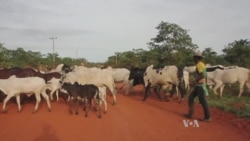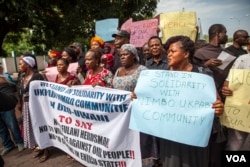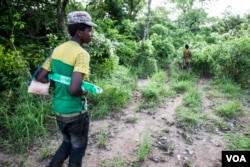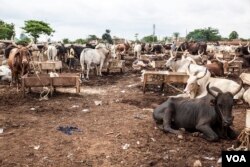The people of Nimbo knew an attack was coming. A villager who said he was kidnapped by nomadic herdsmen had returned home with a letter threatening bloodshed.
Villagers mobilized young men and hired police to protect their farming community.
But at daybreak on that Monday in late April, the police left, and the attackers emerged, shooting and hacking 15 people to death.
“I never believed they can enter the town,” said Patrick Uze, who escaped the attack with machete wounds all over his body. “We were running and running and running.”
Villagers from Nimbo had been feuding with herdsmen in the area for years. They accuse the nomads of chasing them from their farmland, while ethnic Fulani herdsmen leaders say the villagers harass and attack them.
“It goes on and on. This is an avoidable incident,” said Bala Ardo, secretary to the Fulani community in Enugu state.
For a while, this conflict simmered with little outside attention. Then came the April violence.
It is unclear what sparked the dawn raid on the village. One survivor, Beatrice Uzi, told VOA the attackers accused Nimbo of harboring the killer of a herdsman, a death she claims the village had nothing to do with.
Series of raids
The raid was part of a series of brutal attacks and kidnappings this year that have stretched from Nigeria's southern Niger Delta to its northwest corner and have been blamed on herdsmen from the Fulani ethnic group.
Politicians and newspapers have turned Nimbo into a cause celebre, railing against the nomadic herdsmen as a creeping national security threat.
“The onslaught of Fulani herdsmen has been tolerated for so long a time to the extent that one wonders whether killing to them has become a hobby of some sort,” columnist Sunday Onyemaechi Eze wrote on online news site Today.ng.
President Muhammadu Buhari, himself a Fulani who declared cattle among his possessions after taking office last year, put out a statement vowing to deal with “rampaging herdsmen.”
But experts say there’s no common cause to these recent attacks and that most farmers and herdsmen coexist peacefully. When relations do sour and turn violent, it’s usually due to local disputes that go unresolved, along with competition for increasingly scarce land and resources.
“There are growing ecological and demographic pressures in the rural areas of Nigeria. The political authorities are not very effective necessarily at actually managing these conflicts,” said Adam Higazi, a researcher who studies the issue at Modibbo Adama University in northeast Nigeria.
Nimbo residents say they went to the police and local government as the feud with the herdsmen raged, to no avail. An Enugu state police spokesman said the agency had no record of being contacted by the community, but was investigating the incident.
Nimbo residents remember a time when herdsmen would sell villagers unhealthy cows for slaughter at a discount, but those days are long gone.
“Nothing will make us live peacefully with them,” said Beatrice Uzi, who fled from the village during the attack.
About six years ago, herdsmen shot a well-liked hunter from the village after he caught a cow in one of his traps, Uzi said. Villagers say it was an accident. The incident set off a cycle of tit-for-tat violence.
“Sometimes, our people, they fight together. You understand? They kill our people and our people kill them,” said Kingsley Ezeugwu, a former government councilor. He bore deep gashes on his head and back from being attacked with a machete as he fled Nimbo.
Other trouble spots
The trouble is not unique to Nigeria. Nomadic cattle herding is common across west and central Africa. In Ghana, rural communities have complained in recent months of herdsmen destroying crops. In the Central African Republic, armed Fulani herders clashed with local militia stealing cattle as sectarian violence engulfed the country in 2015.
And in various parts of Nigeria, farmers and herdsmen have been at loggerheads for years for reasons ranging from banditry to religious rivalries, Higazi said.
The animosity has cost Nigeria. A report published last year by aid agency Mercy Corps said Nigeria could save $13.7 billion annually if clashes between farmers and herdsmen stopped in several states.
The bloodiest violence happened in 2009 and 2010 under the previous administration, said political commentator Chris Ngwodo. But critics have used the recent violence to tar Buhari’s administration, he said.
“This president is Fulani and this terrible coincidence of identity just puts him in a vulnerable position,” Ngwodo said.
When the central Nigerian village of Agatu was raided last February, with as many as 300 people reportedly killed, the president’s decision not to visit the community raised hackles.
“The fact that he did not react as hastily as would have been ideal did not help him either,” Ngwodo said.
Inaccurate reporting of the attacks may also be fueling outrage.
Major newspapers in Nigeria reported at least 40 people had been killed and multiple homes burned in Nimbo. But when VOA visited the village, only one home had been burned, and police said the death toll was 15.
A week after the attack, residents of the state capital, Enugu, marched in the streets, chanting “the Fulanis are killing us.” Some carried signs advocating a boycott of beef. Similar rallies were held by Nigeria’s diaspora in the United Kingdom and South Africa.
Both groups aggrieved
While the violence in Nimbo was national news, it came as little surprise to the residents of the village, who say they have been forced off their land by herdsmen who kill or rape farmers they encounter.
But local herdsmen say they are also under attack. One Fulani leader told VOA that motorcycle-riding hoodlums were robbing and killing herdsmen in the bush. Another said 16 herdsman had been slain in the southeast this year.
In theory, herdsmen and farmers play complementary roles. Herds can graze on crop remnants, while cows can add manure to fallow fields.
But that symbiosis is breaking down.
“As development comes, these areas that used to be free, used to be fallow, you now have human activity coming,” Ardo said.
Cattle can trample crops, enraging farmers. The problem may get worse in coming years as climate change and desertification push more migrant herders farther south.
“Areas in the north that used to be grazing land have been overtaken by desert,” Ardo said.
Veterinary medicines that prevent diseases afflicting cattle in the south are now easier to get, allowing more herdsmen to make the trip, Higazi said.
Fulani leaders in the southeast told VOA they didn't know who attacked Nimbo but that they suspected it was herdsmen passing through from another state.
Some worry the publicity over the Nimbo incident could stigmatize Fulanis across Nigeria.
“I’m prone to attack every time I move out,” Ardo said. “Not because I am violent, not because of any attack, not because of anything. Simply because I am a Fulani man.”









